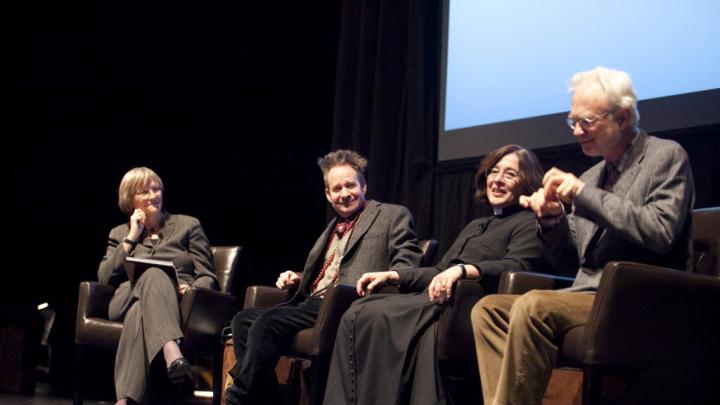The three Harvard College alumni behind the acclaimed 1987 opera Nixon in China—composer John Adams ’69, A.M. ’72, librettist Alice Goodman ’80, and director Peter Sellars ’80—gathered at the American Repertory Theater on November 15 to discuss the opera as part of Harvard’s yearlong 375th anniversary celebration, which kicked off with a party in the Yard on October 14. President Drew Faust, who moderated the colloquy, began by stating that Nixon in China, which drew a mixed reception at its premiere, “has returned as a kind of iconic reality.”
“I thought how astonishing it was that we really didn’t know what the hell we were doing,” said Adams, whose vision of Harvard’s future appeared in the magazine’s 375th anniversary issue. “Sometimes youthful folly and hubris actually work.” Sellars noted that “opera had kind of come to a standstill in the generation before ours. We used to call the broadcasts ‘death from the Met.’ Then opera became alive again.”
Goodman recalled describing the prospective project to filmmaker Fred Wiseman, G ’62, who retorted, “You can’t do that. True art about Nixon can’t be anything that’s not a satire.” Goodman said, “I was lucky enough to have been young enough in 1972 [when Nixon visited China] that I didn’t have the visceral hatred of Nixon that would have crippled the writing of this.” Adams responded, “I did have the visceral hatred, and in fact I had several encounters with my draft board at his [Nixon’s’] request.” He admitted that his initial reaction to Sellars’s proposal was similar to Wiseman’s, and added, “When it premiered in 1987 people expected a work of Pop Art. They were genuinely disappointed that it was not satire.” Adams and Sellars collaborated again last year on a Nixon in China performance at the Metropolitan Opera in New York City, with Adams conducting and Tricia Nixon in the audience. “I was glad she was there,” the composer said, before adding, to laughter, “Though it made me feel we’d lost a tiny bit of our edginess.”
Adams, whose 2009 memoir, Hallelujah Junction, was reviewed in Harvard Magazine, as was his 2000 collection of 10 CDs of his work, Earbox, went on to observe that the theme of the opera was “the coming together of two ways of looking at how humans might live on the planet,” namely under a market economy or a social-welfare state. He found in the work “a wonderful counterpoint between social relevance and artistic satisfaction.”
Goodman said she was persuaded to enter the project not primarily by the brilliance of Adams’s music (“John’s music has this deep, deep core of the American sublime,” Sellars declared) but by its accessibility. “It was John’s vulgarity that I put my trust in,” she said. “There was such life in it.”








